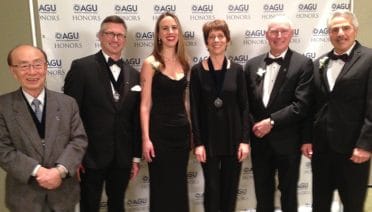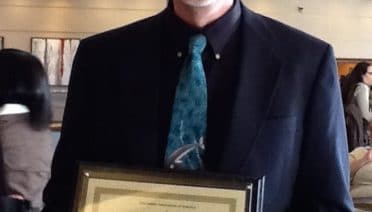Press Room
Woods Hole Oceanographic Institution (WHOI) scientists Rockwell Geyer, Susumu Honjo, and Delia Oppo have been elected 2014 fellows of the American Geophysical Union (AGU).
When a team from the Woods Hole Oceanographic Institution (WHOI) took a specially equipped REMUS SharkCam underwater vehicle to Guadalupe Island in Mexico to film great white sharks in the wild, they captured more than they bargained for.
Although the days of odd behavior among hat makers are a thing of the past, the dangers mercury poses to humans and the environment persist today.
Mercury is a naturally occurring element as well as a by-product of such distinctly human […]
The co-star of the James Cameron’s latest film is not your typical Hollywood starlet. She’s 24-feet long, bright green and weighs approximately 11.8 tons.
The one-of-a-kind, deep-diving submersible DEEPSEA CHALLENGER will travel from its home at the Woods Hole Oceanographic Institution […]
Whale sharks (Rhincodon typus)—which grow more than 30 feet long—are the largest fish in the world’s ocean, but little is known about their movements on a daily basis or over years. A newly discovered juvenile whale shark aggregation off Saudi Arabia is giving researchers a rare glimpse into the lives of these gentle giants.
A new study by scientists at Haverford College and Woods Hole Oceanographic Institution (WHOI) has found that the dispersant compound DOSS, which decreases the size of oil droplets and hampers the formation of large oil slicks, remains associated with oil and can persist in the environment for up to four years.
This summer, Woods Hole Oceanographic Institution’s “Science Made Public” series celebrates the deep-diving submersible Alvin’s 50 years in operation.
A venerable giant in deep ocean research, Alvin has logged many accomplishments over the years, from discovering hydrothermal vents to exploring the Titanic. […]
The Woods Hole Oceanographic Institution has appointed James Bellingham as the first director of its Center for Marine Robotics.
Bellingham will come to WHOI in early fall 2014 from the Monterey Bay Aquarium Research Institute (MBARI), where he was director of […]
Mainly thought to be surface dwellers, Chilean devil rays (Mobula tarapacana) are most often seen gliding through shallow, warm waters. But a new study by scientists at Woods Hole Oceanographic Institution (WHOI) and international colleagues reveals that these large and majestic creatures are actually among the deepest-diving ocean animals.
An international team of scientists studying Emperor penguin populations across Antarctica finds the iconic animals in danger of dramatic declines by the end of the century due to climate change. Their study, published today in Nature Climate Change, finds the […]
The Greenland Ice Sheet is a 1.7 million-square-kilometer, 2-mile thick layer of ice that covers Greenland. Its fate is inextricably linked to our global climate system.
In the last 40 years, ice loss from the Greenland Ice Sheet increased four-fold contributing […]
The Antarctic Peninsula, the northern most region of Antarctica, is experiencing some of the most dramatic changes due to climate warming, including population declines of some penguin species.
This is not the first time that region has felt the effects of […]
We know more about the surface of other planets than we do about Earth’s ocean. And what is known about our ocean would not have been possible without the deep-sea submersible Alvin, one of the hardest working, most reliable vehicles […]
Phytoplankton—tiny, photosynthetic organisms—are essential to life on Earth, supplying us with roughly half the oxygen we breathe. Like all other life forms, phytoplankton require the element phosphorus to carry out critical cellular activity, but in some parts of the world’s […]
Woods Hole Oceanographic Institution (WHOI) biologist Dr. Rebecca Gast and Falmouth (Mass.) High School art teacher Jane Baker have teamed up to bring the excitement of polar research to Falmouth art students.
Gast met with Baker’s Art Two and Advanced Studio […]
The Population Association of America (PAA) selected biologist Hal Caswell of the Woods Hole Oceanographic Institution (WHOI) to receive the 2014 Mindel C. Sheps Award for his contributions to mathematical demography. The PAA is the major professional society devoted to the study of human populations. The prestigious honor is awarded to one scientist biennially on the basis of important contributions to knowledge either in the form of a single piece of work or a continuing record of high achievement.
The ocean is an increasingly industrialized space. Shipping, fishing, and recreational vessels, oil and gas exploration and other human activities all increase noise levels in the ocean and make it more difficult for marine mammals to hear and potentially diminish […]
On Saturday, May 10, 2014, at 2 p.m. local time (10 pm Friday EDT), the hybrid remotely operated vehicle Nereus was confirmed lost at 9,990 meters (6.2 miles) depth in the Kermadec Trench northeast of New Zealand. The unmanned vehicle was working as part of a mission to explore the ocean’s hadal region from 6,000 to nearly 11,000 meters when a portion of it likely imploded.
Scientists from the Woods Hole Oceanographic Institution (WHOI) are kicking off an innovative NOAA-funded pilot program using robotic instruments and computer modeling analysis to shed light on changing ocean conditions in the Gulf of Maine as they relate to the harmful algal bloom (HAB) phenomenon commonly known as the New England red tide.
No place on the planet is more vulnerable to climate change than the polar regions of the Arctic and the Antarctic. Warming waters and the loss of sea ice are affecting the habitat and food source for many polar species […]


